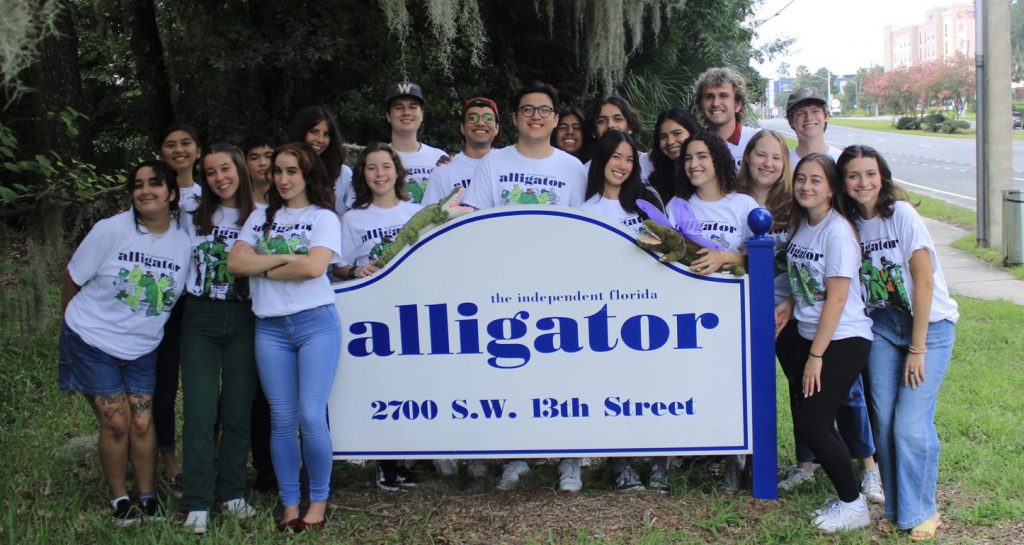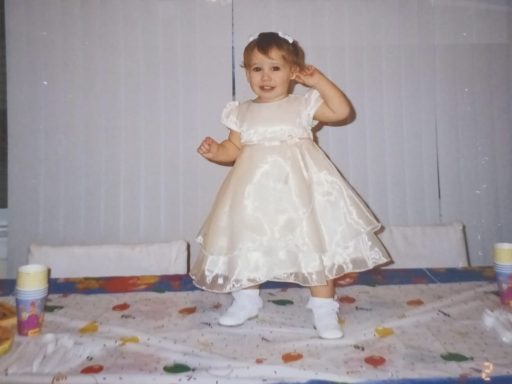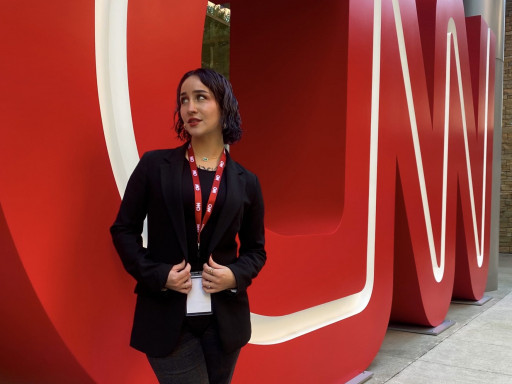First-Gen Journalism Student Navigates a New, Mysterious World at UF
By Gigi Marino

First-generation student Vivienne Serret readily admits she will stop to pick up dropped change, even if it’s just a penny. “A penny is a cent,” she says, “a cent is on its way to being a dollar, and that has value.”
Value for Serret is not necessarily monetary. She is neither a miser nor a cheapskate, but a woman who understands and appreciates that opportunity requires action, particularly in a transactional world. Her background and upbringing have taught her to reach up and grab every opportunity that comes her way.
Serret, a University of Florida College of Journalism and Communications (UFCJC) Journalism senior, is the recipient of the 2024 Society of Professional Journalists Florida Scholarship. Her reporting on the resignation of former UF President Ben Sasse gained national attention.
Expectations of the First-Born American Child
Serret also has written about deeply personal issues in opinion pieces for The Independent Florida Alligator, where she serves as the race and equity reporter. In a piece titled, “Mom crossed the border, so I crossed out my dreams,” she writes, “As a first-generation Latina, it’s been up to me to be the glue that puts back the pieces of shattered dreams that once belonged to the 19-year-old version of my mother — a burden placed on me the second I was born.”
The column discusses how Serret and other first-generation Latinos and Hispanics are expected to become the success stories and family financiers as the first-born Americans in the land of plenty. Serret’s love of theater, writing and art was impractical because those things were not moneymakers. The hope for Serret was that she would become a rich doctor and support her family.

Finding Home in Hialeah
Serret stuck by her love of language and chose to study journalism, first at Santa Fe College in Gainesville, Florida, then transferring to UF, where, as a first-gen student, she continues to experience college life differently from most of her peers.
In addition to being a full-time student, an Alligator reporter and a writer for UFCJC’s state government wire service, Fresh Take Florida, she bartends at Vecino’s and the Hippodrome, pays all her own bills, and sends money home to her mom.
Serret spent her formative years in Hialeah, Florida, her mom and younger brother. She was born in Detroit, but moved to Chicago, where her parents met. Both Cuban, her mother and father did not know each other until they got to the U.S. They both gained immigrant status from the lotteries in the early 1990s.
The marriage did not last, and Serret’s grandmother, who was living in Hialeah, convinced the family to move south. “She told us it was basically a little Cuba 2.0. ‘You can live here and it will be the same or different,’” says Serret. “So, we moved.”
Serret’s mother worked any job she could, but she did not speak English and money was tight. The family experienced periods of homelessness, sleeping on park benches in in Salvation Army shelters. But Serret and her brother never missed school.

She recalls a time when she fell asleep on the bus, and the bus driver did not see her until he had parked the bus for the night. “He immediately drove me back to school before my mother freaked out. I will never forget that.”
Her mother and the bus driver are friends to this day. Serret says her hometown is a place like no other. “Nearly everyone in Hialeah is low income and marginalized because of it. It’s a tight-knit community. Even when I was homeless, I could count on people. Everyone knows everyone else. Everyone’s looking out for each other. We make it like a little barrio,” she says.
“We all chip in to send things back to Cuba because we all have family there too, and there’s a level of understanding among us. Most of your neighbors treat you like their own children, even if you’re not, and it’s one of the things I love the most about my community. If it wasn’t for my community, things could have been a lot different, or maybe even worse.”
Breaking Through
Serret knew that she would have to make her own way in the college landscape and chose to spend her first two years at Santa Fe because it was more economically feasible. Even so, she balanced her coursework between burritos and beauty with part-time jobs at Chipotle and Sephora.
“I’m not going to lie,” she says. “The entire time I was at Santa Fe, I was thinking about UF. The College of Journalism and Communications was my dream.”
Serret researched CJC PATHS, a program targeted toward underrepresented transfer students, and contacted everyone she could find with an email address, introducing herself as a highly motivated first-generation student and capturing the attention of Katrice Graham, director of the Knight Division for Scholarships and Student Inclusion.
Says Serret, “UF supported me one million percent. Dr. Graham did an amazing job at making sure everyone who transferred felt welcomed, even while I was going through my weird imposter syndrome moments.”
Between Two Worlds
While many qualified and talented people experience imposter syndrome, it is especially prevalent among first-gen students who have gaps in their knowledge. For instance, Serret says that she first learned about financial responsibility from a friend who had his own business. He taught her everything about credit, utilization and personal finances. For someone living hand-to-mouth much of her life, the idea having a credit card of her own was more fantasy than reality.

“I didn’t know what FAFSA was or a Pell Grant. When I got them, I was just like, woohoo, but I didn’t know what it meant. I didn’t know about credit, taxes or debt. I didn’t know what life was because my mom didn’t know either,” she says. “Americans get jobs and live a happy life, so you have to do it. And I did — in the best way possible. I’m happy and proud of myself for it, but I had no idea what to expect.”
Serret’s idea of college was shaped more by movies than experience. “Their portrayal of college was you go to class and you party. I was very confused by college. I had no idea what a sorority or fraternity were,” she says.
At UF, Serret met students who were third- or fourth-generation Gators, an experience she could not even begin to understand. “Meeting people who come from generations of University attendees is amazing. Absolutely.”
What remained the constant common factor was her ability to seek out every opportunity, work hard and make gratitude a daily practice. In high school, she says, she had several side hustles — creating and selling buttons and stickers online, participating in talent shows and singing contest, tutoring and even doing homework for pay.
If Serret and her brother wanted money for food, she was responsible for finding it. She became an expert at scouring the floors for loose change near the vending machines — every coin an opportunity not to be missed.
Icing Imposter Syndrome
Serret appeared on the podcast The Journalism Salute in September, telling host Mark Simon, “You feel like an imposter amongst the sea of wealthier white peers, or feel like maybe you’re letting everyone in your family down because you still chose an unstable career. You try to work harder than everyone, just to prove you are more than a statistic.”
That feeling of being an imposter has now evolved into something else entirely. Today, Serret speaks with the confidence of someone who knows exactly where she belongs. “I am not afraid,” she says about the possibility of failing as a journalist, with so many predicting the industry’s demise. “I’m over imposter syndrome, over feelings of failure, feelings of I don’t belong.”
Having grown up understanding the value of every opportunity, Serret has transformed that doggedness into investigating stories that matter. She’s already applying to newsrooms across the country. “I want to wake up and have things to do immediately,” she says. “I want to go to a courtroom, I want to go to a scene, I want to go everywhere all at once, and I want to do it now.”
Category: College News, Profiles, Student News
Tagged: First-gen students Vivienne Serret
Subscribe to our News Digest


